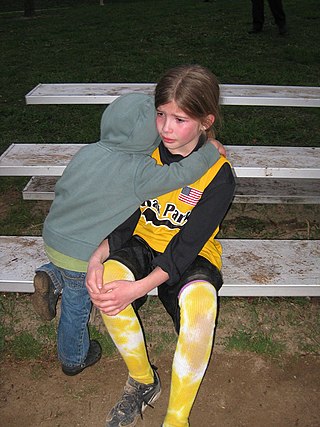
Compassion is a social feeling that motivates people to go out of their way to relieve the physical, mental, or emotional pains of others and themselves. Compassion is sensitivity to the emotional aspects of the suffering of others. When based on notions such as fairness, justice, and interdependence, it may be considered partially rational in nature.
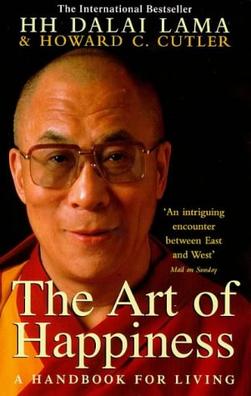
The Art of Happiness is a book by the 14th Dalai Lama and Howard Cutler, a psychiatrist who posed questions to the Dalai Lama. Cutler quotes the Dalai Lama at length, providing context and describing some details of the settings in which the interviews took place, as well as adding his own reflections on issues raised.

Linda Pritzker also known by the name Lama Tsomo is an American lama in the Tibetan Buddhist tradition. She is a spiritual teacher, author, philanthropist, and co-founder of the Namchak Foundation and Namchak Retreat Ranch in Missoula, Montana. She is a member of the Pritzker family, known for the Hyatt Hotel fortune.

Buddhist vegetarianism is the practice of vegetarianism by significant portions of Mahayana Buddhist monastics and laypersons as well as some Buddhists of other sects. In Buddhism, the views on vegetarianism vary between different schools of thought. The Mahayana schools generally recommend a vegetarian diet, claiming that Gautama Buddha set forth in some of the sutras that his followers must not eat the flesh of any sentient being.

Religion and environmentalism is an emerging interdisciplinary subfield in the academic disciplines of religious studies, religious ethics, the sociology of religion, and theology amongst others, with environmentalism and ecological principles as a primary focus.
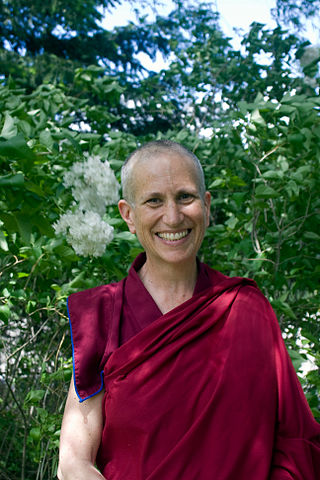
Thubten Chodron, born Cheryl Greene, is an American Tibetan Buddhist nun, author, teacher, and the founder and abbess of Sravasti Abbey, the only Tibetan Buddhist training monastery for Western nuns and monks in the United States. Chodron is a central figure in the reinstatement of the Bhikshuni ordination of women. She is a student of the 14th Dalai Lama, Tsenzhab Serkong Rinpoche, Lama Thubten Yeshe, Thubten Zopa Rinpoche, and other Tibetan masters. She has published many books on Buddhist philosophy and meditation, and is co-authoring with the Dalai Lama a multi-volume series of teachings on the Buddhist path, The Library of Wisdom and Compassion.

Pritish Nandy is an Indian poet, painter, journalist, parliamentarian, media and television personality, animal activist and maker of films, TV and streaming content. He was a parliamentarian in the Rajya Sabha from Maharashtra, elected on a ticket from the Shiv Sena. He is the author of forty books of poetry in English and has translated poems by other writers from Bengali, Urdu and Punjabi into English as well as a new version of the Isha Upanishad. Apart from these, he has authored books of stories and non fiction as well as three books of translations of classical love poetry from Sanskrit. He was Publishing Director of The Times of India Group and Editor of The Illustrated Weekly of India, The Independent, and Filmfare in the 1980s, all simultaneously. He has held six exhibitions of his paintings and calligraphy. He founded Pritish Nandy Communications Ltd, the content company, in 1993. He also founded People for Animals, India's first animal rights NGO which is currently run by co-founder Maneka Gandhi as chairperson.

Scott Plous is an American academic social psychologist. He is currently a Professor of Psychology at Wesleyan University and Executive Director of Social Psychology Network.

A Closer Walk is Robert Bilheimer's documentary film about the global AIDS epidemic. Narrated by Glenn Close and Will Smith, A Closer Walk features cinematography by Richard D. Young, interviews with the Dalai Lama, Bono, and Kofi Annan, and musical contributions by Annie Lennox, The Neville Brothers, Dido, Eric Clapton, Moby, Geoffrey Oryema, and Sade.

The 14th Dalai Lama is, as the incumbent Dalai Lama, the highest spiritual leader and head of Tibetan Buddhism. By the adherents of Tibetan Buddhism, he is considered a living Bodhisattva; specifically, an emanation of Avalokiteśvara in Sanskrit, and Chenrezig in Tibetan. He is also the leader and a monk of the Gelug school, the newest school of Tibetan Buddhism, formally headed by the Ganden Tripa. The central government of Tibet at the time of his selection, the Ganden Phodrang, invested the Dalai Lama with temporal duties until his exile in 1959.
Charter for Compassion is a document written in 2009 that urges the peoples and religions of the world to embrace the core value of compassion. The charter is currently available in more than 30 languages and has been endorsed by more than two million individuals.
The Social Psychology Network (SPN) is an educational organization with more than 1,500 members worldwide. SPN was founded by psychology professor Scott Plous as a website in 1996. Development of SPN was supported by several grants from the National Science Foundation. The website includes a large collection of social psychology links, a feed of related news, and discussion forums for students and professionals interested in social psychology.
Jon Eliot Ramer is an American entrepreneur, civic leader, inventor, and musician. He is co-founder of several technology companies including Ramer and Associates, ELF Technologies, Inc.,(whose main solution, Serengeti, was purchased by Thomson Reuters) and Smart Channels. The designer and co-founder of several Deep Social Networks, he is the former executive director of the Interra Project, and a co-founder of Ideal Network, a group-buying social enterprise that donates a percentage of every purchase to a non-profit or school. Ideal Network is a certified B-Corp that was recognized as "Best in the World for Community" in 2012 by B-Labs. He is also the designer and co-founder of Compassionate Action Network International, a 501(c)(3) organization based in Seattle, that led the effort to make the city the first in the world to affirm Karen Armstrong's Charter for Compassion. Most recently, Ramer conceived of and produced the "Compassion Games: Survival of the Kindest" in response to a challenge from the mayor of Louisville, Kentucky to other cities to outdo Louisville's compassionate action as measured by hours of community service. Ramer also serves as Director and Chief Technology Officer at Four Worlds International Institute, with a focus on the Campaign To Protect the Sacred. The campaign birthed the International Treaty to Protect the Sacred from Tar Sands Projects, signed by over fifty different tribes throughout North America. Ramer is also the songwriter and lead guitarist in the band Once And For All.
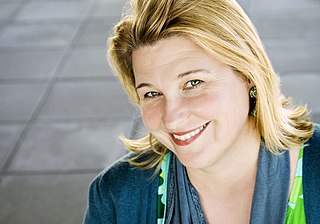
Tania Singer is a German psychologist and social neuroscientist and the scientific director of the Max Planck Society's Social Neuroscience Lab in Berlin, Germany. Between 2007 and 2010, she became the inaugural chair of social neuroscience and neuroeconomics at the University of Zurich and was the co-director of the Laboratory for Social and Neural Systems Research in Zurich. Her research focuses on the developmental, neuronal, and hormonal mechanisms underlying human social behavior and social emotions such as compassion and empathy. She is founder and principal investigator of the ReSource project, one of the largest longitudinal studies on the effects of mental training on brain plasticity as well as mental and physical health, co-funded by the European Research Council. She also collaborates with the macro-economist Dennis Snower on research on caring economics. Singer's Caring Economics: Conversations on Altruism and Compassion, Between Scientists, Economists, and the Dalai Lama was published in 2015. She is the daughter of the neuroscientist Wolf Singer.

The Mind & Life Institute is a US-registered, not-for-profit 501(c)(3) organization founded in 1991 to establish the field of contemplative sciences. Based in Charlottesville, Va., the institute “brings science and contemplative wisdom together to better understand the mind and create positive change in the world." Over three decades, Mind & Life has played a key role in the mindfulness meditation movement by funding research projects and think tanks, and by convening conferences and dialogues with the Dalai Lama. Since 2020, Mind & Life's grant-making, events, and digital programs have sought to nurture personal wellbeing, build more compassionate communities, and strengthen the human–earth connection.
World Compassion Day, often abbreviated to WCD, is an idea based on Ahimsa and Compassion. It is a day for global icons to share their ideologies, values and principles on how to make the Gandhian ideals of Ahimsa and Compassion relevant to our times.
The Garrison Institute is a non-profit, non-sectarian organization located in Garrison, New York, that is committed to harnessing the power of contemplative wisdom and practice—from many traditions, and in many different contexts—to build a more compassionate and resilient future for all. Working collaboratively with practitioners in diverse fields, the Institute develops and hosts retreats and symposia, produces research and publications, and provides a hub for ongoing learning networks.
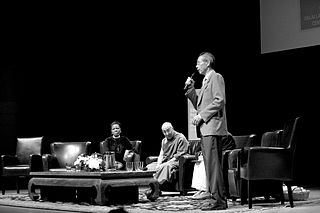
Victor Chan is a physicist and a Hong-Kong-born Canadian writer. Founder of the Dalai Lama Center for Peace and Education, Chan has known the 14th Dalai Lama since 1972. Co-author with him of two essays, he also wrote a guide of pilgrimage to Tibet. He lives in Vancouver in British Columbia, Canada.
Action teaching is a style of instruction that aims to teach students about subject material while also contributing to the betterment of society. The approach represents an educational counterpart to action research, a method first developed by Kurt Lewin in the 1940s to address racial prejudice, anti-Semitism, and other societal problems through the integration of social science and social action. Proponents of action teaching argue that by allowing students to take action on social issues as part of the learning process, action teaching deepens learning, heightens student engagement, and provides students with a "scaffold" for future prosocial civic action.














